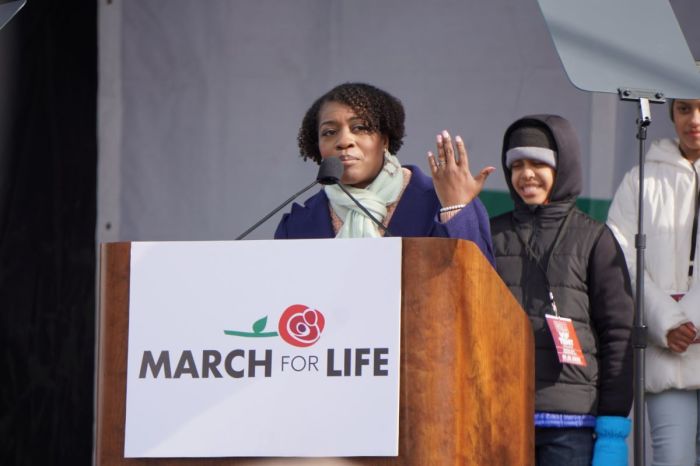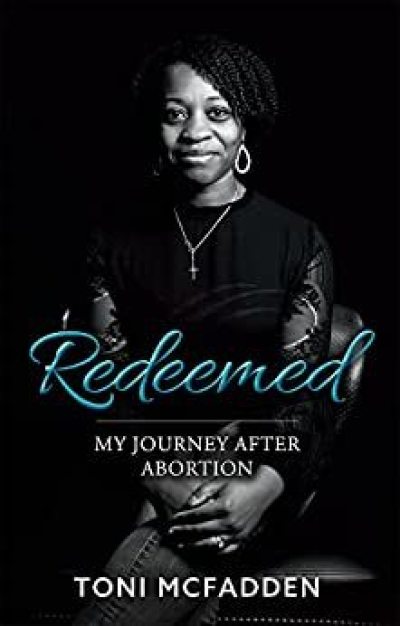African American author recalls seeing her aborted baby in a divine dream: 'His name is Tyler'

An African American author who recounted her own decision to get an abortion as a teenager at last month’s March for Life has shared how her faith in Christ helped her heal from post-abortive trauma, recounting a dream where God revealed her aborted son.
Toni McFadden is one of many who spoke at the 2022 March for Life in Washington, D.C. on Jan. 21, expressing regret for the abortion she had as a senior in high school and detailing how she suffered severe hemorrhaging a month after taking a second dose of the abortion pill.
McFadden, who now runs the organization Relationships Matter with the aim of educating the youth on the degradation of sex in culture, is the author of the upcoming book Redeemed: My Journey After Abortion.
McFadden documents the story of her abortion as a teenager in Allentown, Pennsylvania, and her healing process in detail. The book, scheduled for publication in paperback format on Apr. 11, is currently available in Kindle format on Amazon and as an eBook from Barnes & Noble.

Now a married mother of four, McFadden attributes her successful lengthy healing process that followed her abortion to her faith in Christ, which began to solidify when she was in college.
“If it wasn’t for my faith, I don’t think I would be healed right now,” she told The Christian Post in a recent interview. “God showed me not only my sin, but He showed me what He did with my sin by dying on the cross for my sins.”
While God showed McFadden that she was “created for more,” He also forced her to “take responsibility” for her abortion.
“I think I would still be sitting in shame if not for the Gospel,” she suggested.
“I think I would still be sitting in condemnation if it wasn’t for Jesus coming and rescuing my soul and showing me what life was truly supposed to be. So I’ve been having a testimony to tell,” she said.
Changing worldview
After rejoicing that she had given her life “over to Jesus,” McFadden declared: “I know that His word — the Bible — is alive and it has shaped me and it has changed my worldview. It has changed the way I view life from womb to tomb.”
Before she gave her life to Jesus, McFadden said she didn’t have a “strong faith” but “knew things about God.” Knowing things about God, she said, is “very different than having a relationship with God.”
“I went to church here and there, but it wasn’t consistent. And I think I’ve learned things about God, which … I’m thankful for,” she recalled. “I’m thankful that I was exposed to Christianity when I was younger, but I don’t think it took root in my life until after I was in college.”
McFadden became a Christian in 2001 but didn’t talk about her abortion until three years after her conversion.
“I don’t even think when I became a Christian, I knew what the term pro-life even meant,” she said.
“I think I knew when I became a believer reading the Bible that abortion was wrong, but I don’t think I took a stand until probably … 2005 when I started working for the crisis pregnancy center and started going through my healing.”
During remarks she gave at the Heritage Foundation headquarters in Washington, D.C. on Feb. 14, McFadden explained how pressure from her boyfriend and her best friend influenced her to have an abortion when faced with the unplanned pregnancy.
When she had a sonogram shortly before the abortion, she asked the nurse to show her the screen, which was faced away from her. The nurse showed her the sonogram.
McFadden said she wishes she “would have just had somebody else with a different perspective, the perspective of life” at the time of her abortion instead of those around her who assured her that “this is normal” and “this is what you have to do.”
She reiterated that, at the time, she viewed abortion as her “only option.” She was given abortion pills from an abortion clinic in what she characterized as an area of Allentown with a high minority population.
In McFadden’s case, the boyfriend broke up with her immediately after her abortion although she cited concerns he would leave her if she did not go through with the procedure as one of the reasons why she terminated her pregnancy. But ultimately, the boyfriend “came back to me almost nine years later to apologize to me.”
The two eventually married and now have four children, three of whom joined them on stage at the March for Life. Her children are 11, 10, 9 and 7 years old.
To this day, McFadden still thinks about the baby she aborted.
“His name is Tyler,” she said. “I named him when I went through post-abortion counseling, so my husband had not come along yet. This is something [that happened] when I was going through my own healing, and the Lord gave me a dream and showed me that the baby was a boy.”
Telling her kids about their sibling
As demonstrated by their presence on stage with her at the March for Life, three of her four children know McFadden’s abortion story.
She sat down with each of them separately to tell them what happened because she “didn’t want them to find out from somewhere else, like Google.”
“That was probably the most difficult conversation, and it’s an ongoing conversation because … they’re still pretty young,” she said. “We [told] them as much as we thought they could handle. … They don’t know … the procedure I went through, they don’t know anything like that. But we understand that it’s going to be an ongoing conversation.”
“As they mature in life, they’ll be able to handle a little bit more depth of our story,” she predicted. “They understand that they are supposed to have another sibling, and they just know abortion is wrong. And so they question like, ‘Why would you do something like that?’… Kids don’t use euphemisms like adults do, and they don’t sugarcoat things.”
McFadden said it was “heartbreaking” when one of her children asked: “So we’re supposed to have another sibling?”
She responded to her child by saying, “Yeah, you are.”
“We wish we could go back and change it, but we can’t, and this is why mommy … goes out and speaks because I don’t want any other people to go through this and I want other women … and men to know that they can have healing,” McFadden recalls telling her child.
McFadden expressed gratitude for “a God who redeems.”
“He can take the pain and the mistakes of our past and make something absolutely beautiful out of it,” she said.
McFadden closed the interview by assuring women who have walked the same journey and maybe in a place of “shame” that “healing is possible.” She offered “pursuing a relationship with Jesus Christ” and an eight-week Bible study called Forgiven and Set Free by Linda Cochran as remedies for women experiencing post-abortive trauma.
McFadden weighed in on the state of the pro-life movement with the U.S. Supreme Court scheduled to make a ruling in the case of Dobbs v. Jackson Women’s Health. A ruling in favor of the state of Mississippi, which is seeking to uphold a 15-week abortion ban, would weaken the precedent set by Roe v. Wade, the 1973 Supreme Court decision that legalized abortion nationwide.
“I’m very hopeful that Roe v. Wade is overturned. And that is going to change our nation. I think that the pro-life movement still needs to be the pro-life movement, regardless [of] if Roe v. Wade is overturned or not because we know it’s going to be brought to the states. But even if the state says ... abortion is illegal, women are still going to face unplanned pregnancies. And the pro-life movement needs to be who we are right now, and that is we are the ones meeting the needs of these women who are going through it right now.”
‘They want to eliminate those who look exactly like me’
Since the March for Life, McFadden has spoken at other pro-life events, including a press conference hosted by the conservative think tank Heritage Foundation announcing the relaunch of the “Standing with You” initiative for women facing unplanned pregnancies.
“Not only does the abortion industry not care about women, but they want to eliminate those who look exactly like me,” McFadden claimed at the event.
“The act of abortion is literally wiping out the black community,” she proclaimed. “Yet NARAL and Planned Parenthood want to celebrate Black History Month and pretend they care about black lives while telling blacks and minorities that restrictions on abortion [are] racist and that we need access to abortion to thrive. They are walking right in step with their racist founder, Margaret Sanger.”
In her interview with CP, McFadden elaborated on why abortion advocacy group NARAL and abortion giant Planned Parenthood’s recognition of Black History Month ring hollow as long as they continue to promote abortion and assert that restrictions on abortion are racist.
“It’s an absolute lie. What they’re saying is a lie,” she argued. “Black Americans make up 12-13% of the population, yet they’re putting all of their abortion facilities, over 80% of them, in our neighborhoods.”
“And then they say that there is a lack of access [for] black women and women of color. That’s not true,” she continued.
“They’re within walking distance in their cities. And it goes back to their founder, Margaret Sanger, who they’re trying to disavow. But it goes back to her saying [they] don’t want word to get out that [they] want to eliminate the negro population. That’s what she said, but it’s actually working. Planned Parenthood kills 360 black babies a day.”
Additionally, she insisted that “if abortion didn’t exist, black Americans wouldn’t even be a minority.”
The statistics McFadden pointed to come from the pro-life Radiance Foundation, which determined the 360-a-day figure based on the data from Planned Parenthood’s 2018-2019 annual report revealing that the organization committed 345,672 abortions in that period.
Applying the statistic from the Centers for Disease Control and Prevention finding that black babies constitute 38% of abortions to the total number of abortions committed by Planned Parenthood led the pro-life organization to conclude that roughly 131,355 black babies lost their lives to abortions that year. Dividing 131,355 by the 365 days in a year results in a quotient rounding up to 360.
‘Degradation of sex in our culture’
She told CP that she sees the “degradation of sex in our culture” as a root cause behind the high number of abortions in the U.S.
“We’ve taken the meaning out of it, where God is the Creator of sex. And sex inside the boundaries of marriage has benefits; not just procreation but [it] is also protected by a lifelong commitment,” she asserted.
Because sex has become “mainly just about a feeling in our culture,” McFadden stated that there is “so much divorce” stemming from the fact that the “sexual revolution” has led to people “not taking marriage seriously” and failing to take “commitment seriously.”
McFadden lamented the epidemic of “broken homes,” stressing that “it’s not normal anymore to have parents who are still together.”
“I think that’s mainly because of the way our culture sees sex, in music and [in] the movies,” she said. “They’re just surrounded by [sex]. Not only is it degrading to these teens, but we’re seeing the after-effects down the road.”
The “after-effect” that causes the pro-life activist the most concern is the rush to abort following unplanned pregnancies, an experience she knows all too well.
Ryan Foley is a reporter for The Christian Post. He can be reached at: [email protected]




























